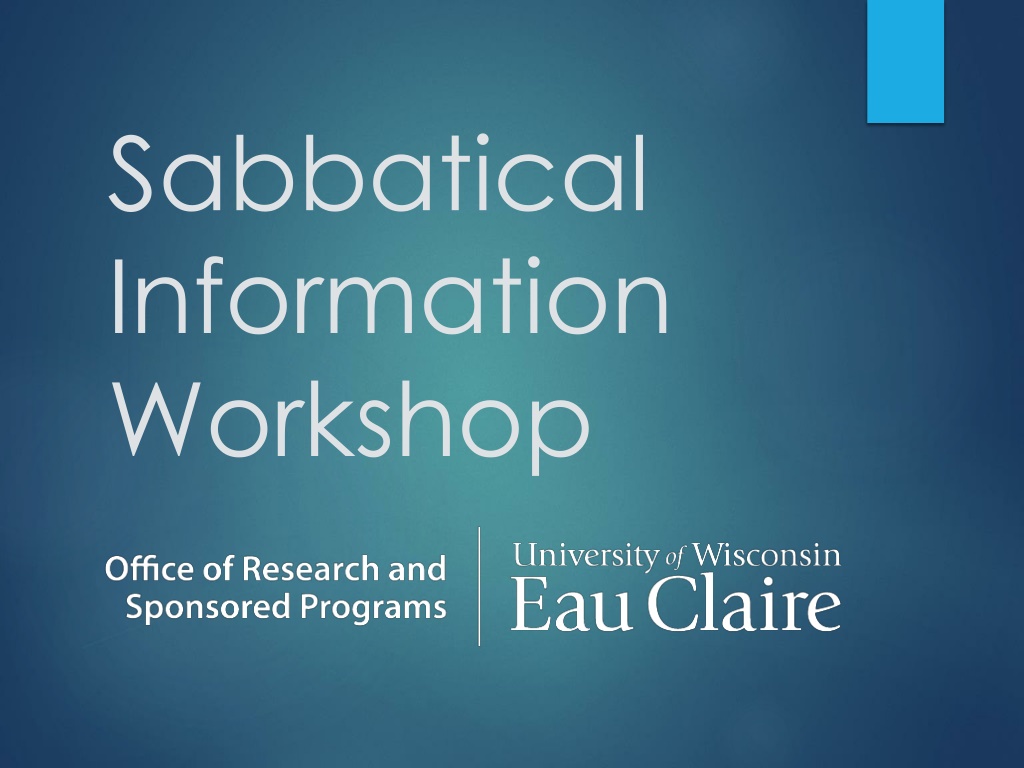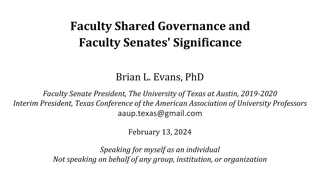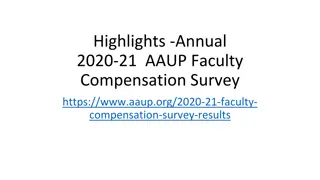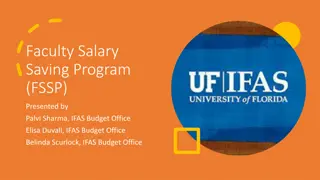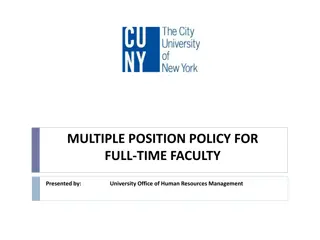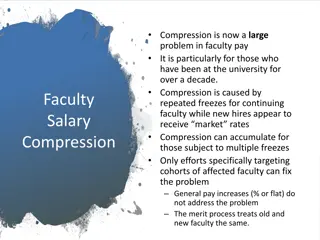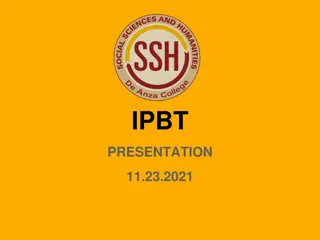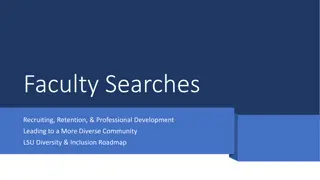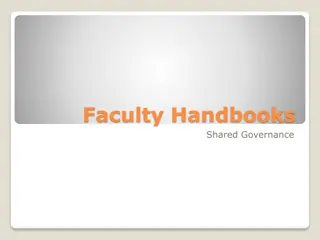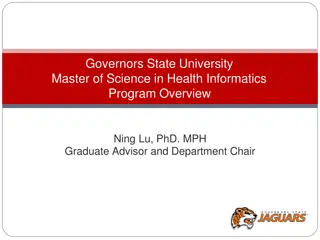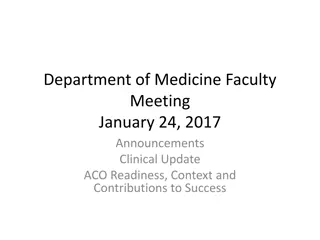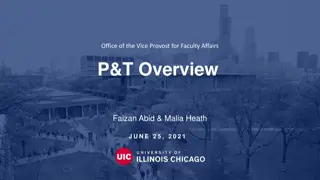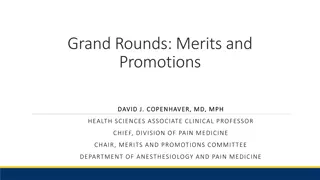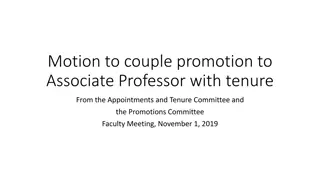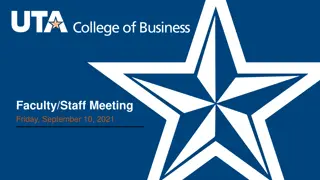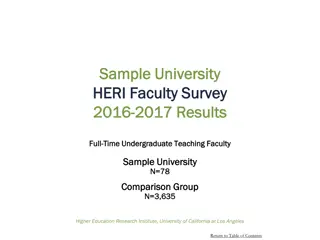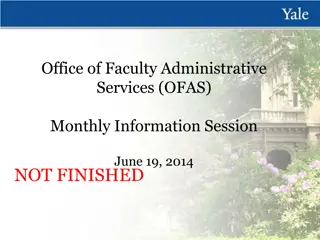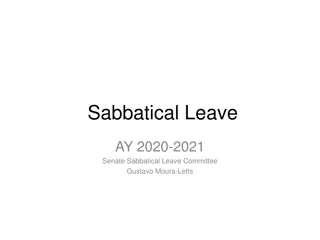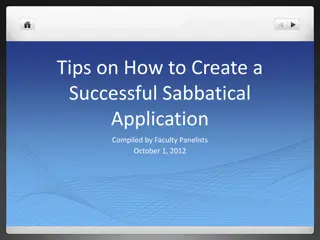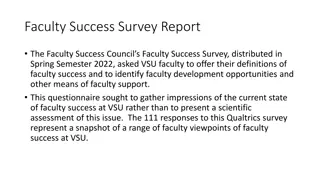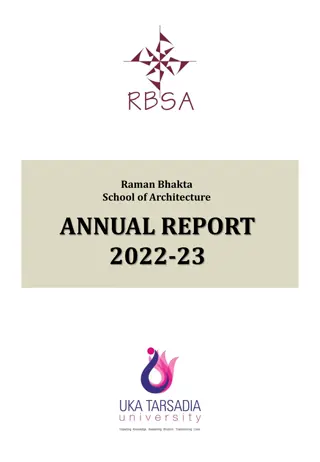UW System Faculty Sabbatical Program Information
The UW System Faculty Sabbatical Program provides opportunities for faculty members to engage in intensive study, enhance teaching and scholarship, and avoid burnout. Eligibility criteria, types of sabbatical leaves, project examples, and communication with department chairs are outlined in detail. The program aims to support faculty development and academic enrichment.
Download Presentation

Please find below an Image/Link to download the presentation.
The content on the website is provided AS IS for your information and personal use only. It may not be sold, licensed, or shared on other websites without obtaining consent from the author.If you encounter any issues during the download, it is possible that the publisher has removed the file from their server.
You are allowed to download the files provided on this website for personal or commercial use, subject to the condition that they are used lawfully. All files are the property of their respective owners.
The content on the website is provided AS IS for your information and personal use only. It may not be sold, licensed, or shared on other websites without obtaining consent from the author.
E N D
Presentation Transcript
Sabbatical Information Workshop
Welcome Erica Benson, Interim Director of the Office of Research and Sponsored Programs Introductions Your name and department What you hope to get out of the workshop I d like to tailor the workshop to your needs and interests
Purpose The UW System Faculty Sabbatical Program: Enables recipients to be engaged in intensive study while on leave of absence in order to become more effective teachers and scholars and to enhance their services to the University. Enliven scholarship and teaching Learn something new Work with other scholars and/or in a new environment Avoid burn-out
Eligibility Sabbatical may be awarded after 6 years of full-time instructional service or its equivalent Leaves of absence are subtracted from years of service Preference given to those without a leave of absence within the past 4 years At UW-Eau Claire practice is after successful tenure decision Must return for at least one year following the sabbatical leave (or return compensation received while on sabbatical)
Types of Sabbatical Leave One-semester leave with full pay Full academic year leave with 65% salary Year-long sabbaticals make semester sabbaticals possible o Cost of sabbatical: salary savings vs. replacement costs o Net cost of all sabbaticals = 0 Scope of project should match time requested If a full-year sabbatical is approved, it can t be changed to a semester
Typical Kinds of Projects o Early Career (recently tenured) Tend to build on/expand pre-tenure accomplishments Conversion of published articles intoa book Analysis of accumulated data for publication Expanding an existing collection of creative works o Later Career (>5 years after tenure) Types described under early career Continued scholarship Restarting scholarship Changing directions
Communicate with Chair Discuss timing of sabbatical and course arrangements with your chair early in the process o Teaching load needs to be covered o Can courses not be offered? o Can colleagues take on more students in courses to allow for coverage? o Can colleagues take on overloads? o Will a replacement hire be necessary? o Service should also be discussed o Chairs are asked to detail schedule and costs for covering sabbatical
Application Timeline Proposals are due one-year in advance of the start of the academic year of sabbatical; check exact due date on ORSP web page. For AY 2024-25 leave, sabbatical proposals due September 8, 2023 to Chair. Chair and dean review forms and send to ORSP within the week o Have a colleague review proposal o If preliminary review/comment desired, submit project description to ORSP 4-8 weeks early (earlier is better)
Application (BP Logix) General Information: o Title, year vs. semester o Abstract (100 words) public face of sabbatical (3rd person narrative) o Start date, leaves of absence (including past sabbatical leave), grant applications o List of goals/aims; list of expected outcomes Attachments: o Project Description 6-10 pp., numbered, double-spaced o Qualifications and Past University Contributions (to teaching, service, scholarship and EDI) also including how project builds on past accomplishments and supports long range career goals up to 3 pp. o CV to substantiate qualifications o Letter(s) of endorsement (optional) scholar familiar with work who can speak to significance of project or collaborator/service provider
Project Description (6-10 pp. double spaced) Aims of the project and its significance to the discipline Project approach and plan Planned outcomes for the project by which success of the project will be demonstrated Timeline and discussion of why a time reassignment from teaching/service is needed Expected benefits for the applicant, the academic discipline, the university and students as a result of the project
Eform Submission Process Comment box, initial any comments Fill in names of chair and dean Send to chair o Comments o Lays out teaching coverage plan/cost to Dean Chair send to Dean o Reviews and certifies replacement costs Replacement costs are not provided to review committee
Review Process URCA Council members independently read and evaluate proposals based on review criteria (posted on sabbatical webpage) Committee discusses reviews/rankings to come to consensus Recommendations are made to Provost (and proposals forwarded) Deans and Provost meet to consider reviews/rankings, chair and dean evaluations, and financial logistics Provost makes decisions and forwards recommendations to UW-System Administration Applicants informed at this time Announced December Board of Regents meeting
Evaluation Criteria Rate on merit of proposal and past contributions (10 points/category) o Concept o Outcomes & Scope o Plan, Logistics, Timeframe o Deliverables & Benefits o Record o Career Arc 50-60: Outstanding proposal 40-49: Strong proposal 25-39: Fair proposal
Reviewers Sabbatical & URCA Review Committee o Tenured faculty who (ideally) have been awarded a sabbatical; at least one per College, and in CAS, one STEM, Social Science, Arts, Humanities o Chaired by ORSP Director Reviewers have a heavy burden lots to read within a tight timeline. Work with them by submitting proposals that are: o Succinct, clearly written o Well organized with headings and subheadings, as appropriate o Accessible, even if not an expert in the field
Final Report Report on sabbatical: o March 1 (fall leave) o October 15 (spring or AY leave) Report format provided by ORSP o 2-4 pages o Goals/aims and expected outcomes o Accomplishments and reasons for deviation (if any) To chair, copied to dean, provost, ORSP
Funding Extramural grants See Finding External Grants Internal grants o URCA early January deadline $500-$3000 travel, services, supplies; every other year o Other options in some circumstances Small Research Grant first of month up to $500 Workshops and Special Projects Travel first of month up to $1,500 Sabbatical income can t exceed regular salary
Some Key Guidelines Sabbatical is a privilege, not a right Sabbatical salary + grants/awards < salary Exception: extra cost reimbursement (travel, additional living expenses, etc.) No paid employment during period of leave unless stipulated as condition of leave Come back or pay back Final report Program must be cost-neutral
Recent History Academic Year # of Applications % Approved 15-16 19 36.8 16-17 9 100 17-18 16 56.3 18-19 20 80.0 19-20 15 93.3 20-21 24 66.7 21-22 15 66.7 22-23 16 100 23-24 13 100
Questions? Sabbatical Leave Program for Instructional Faculty webpage orsp@uwec.edu Erica Benson, Interim Director bensonej@uwec.edu Heather Johnson Schmitz, Manager of Grants and Contracts schmitzh@uwec.edu
